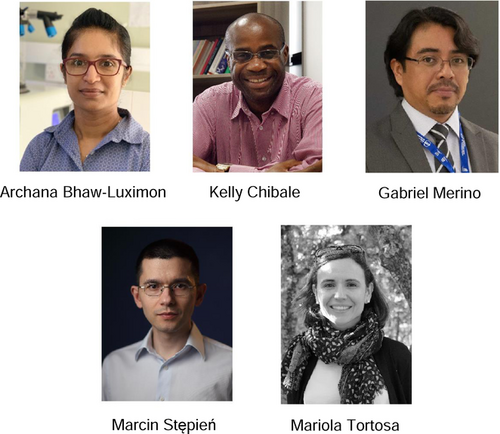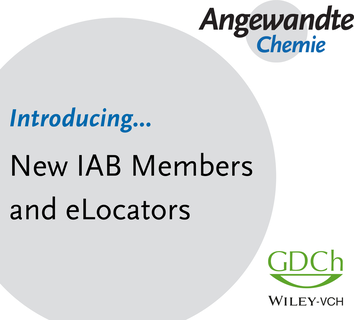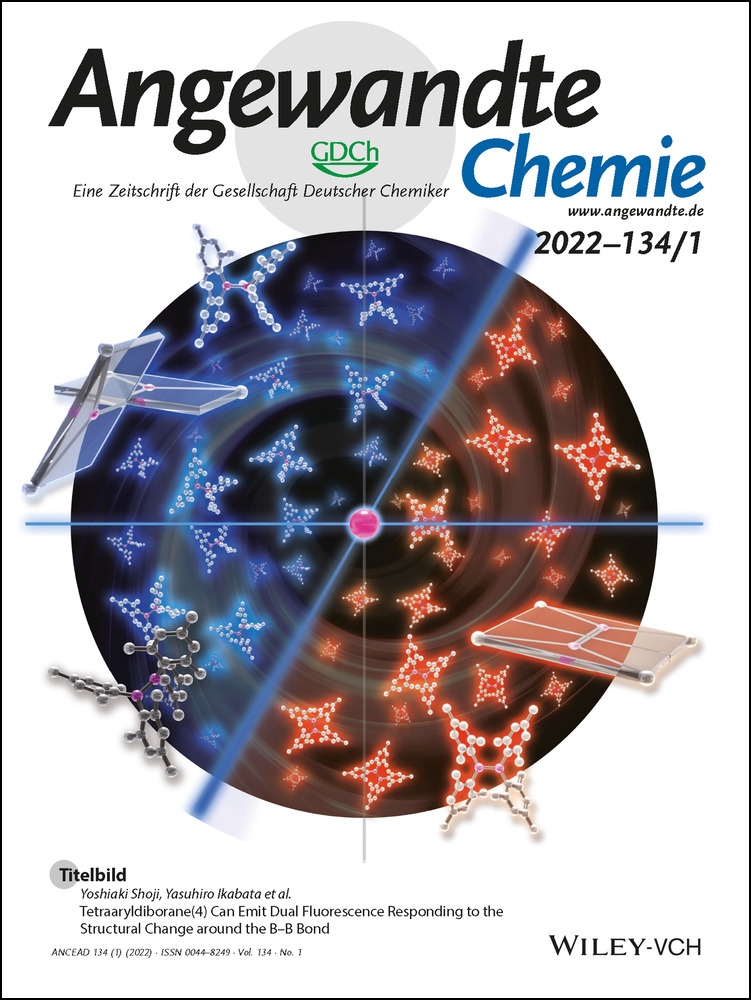Angewandte Chemie Continues To Evolve into 2022
Graphical Abstract
In 2021, among other changes, Angewandte Chemie established a new governance structure with ten Advisory Editors and a redefined International Advisory Board (IAB) and introduced new article types. The journal will continue to evolve in 2022 and beyond, with five new IAB members and the move from the use of page numbers to eLocators as the first changes of the new year.
The past twelve months have seen many changes at Angewandte Chemie. Together with the German Chemical Society (GDCh) as the journal′s owner society, the Scientific Advisory Committee, and the International Advisory Board, the in-house editorial team has worked hard to ensure that the journal evolves with the needs and desires of its community and continues to select papers of the highest relevance and quality in a thorough and fair evaluation process.
The new governance structure of the journal is now firmly established.1 The Angewandte Chemie Council oversees the strategic development of the journal as well as its operational success. Its members are Annette G. Beck-Sickinger as Chair of the International Advisory Board (IAB), Peter R. Schreiner (GDCh President 2020&2021), Katharina Landfester (GDCh Publisher Relations), and Wolfram Koch (GDCh Executive Director), as well as Helma Wennemers as Chair of the Scientific Advisory Committee (SAC). They meet with the authors of this Editorial, as the Executive Editors of the journal (Figure 1), on a monthly basis to make strategic decisions and ensure the journal′s future success in a world of continuous change.

On the Executive Committee of Angewandte Chemie, Frank Maaß and Nathalie Weickgenannt are responsible for the scientific and editorial content of the journal, peer review, and editorial decision-making. Neville Compton is in charge of the operational management of the editorial office, and Theresa Kueckmann is responsible for the strategic direction of the journal. Xin Su and Suzanne Tobey are the regional representatives for Asia and the Americas, respectively.
The ten Advisory Editors,1 who make up the SAC, have provided judicious guidance to the in-house editorial team in making fair and well-founded decisions, especially on the most challenging submissions. Combining their insight as research-active scientists with the editorial independence of our in-house team has established an even more robust and informed evaluation process for submissions to Angewandte Chemie. The Advisory Editors presented their research and discussed their role with the journal in the three Angewandte Fall Symposia, the recordings of which can be found online.
The International Advisory Board2 (IAB) has been particularly important in guiding our actions towards becoming an inclusive and equitable journal. With the 37 additional members invited by the Angewandte Chemie Council in July, many of whom are in early stages of their career or are from regions that were previously underrepresented within our governing bodies, the IAB represents the diversity of the chemistry field and serves to bring the concerns and ideas of our entire community into the journal′s decision-making processes. We thank the 14 IAB members whose terms of office finish at the end of 2021 for their valuable input and support over many years. In January 2022, Archana Bhaw-Luximon (University of Mauritius, Mauritius), Kelly Chibale (University of Cape Town, South Africa), Gabriel Merino (Cinvestav Mérida, Mexico), Marcin Stępień (Uniwersytet Wrocławski, Poland), and Mariola Tortosa (Universidad Autónoma de Madrid, Spain) will join the IAB (Figure 2). The IAB will come together with the handling editors of the journal in their second virtual meeting at the end of January to continue the close interactions of the past months and to discuss emerging fields and topics, editorial developments, as well as ongoing changes in the chemical community.

Archana Bhaw-Luximon (University of Mauritius, Mauritius), Kelly Chibale (University of Cape Town, South Africa), Gabriel Merino (Cinvestav Mérida, Mexico), Marcin Stępień (Uniwersytet Wrocławski, Poland), and Mariola Tortosa (Universidad Autónoma de Madrid, Spain) are joining the Angewandte Chemie International Advisory Board in January 2022.
Angewandte Chemie aspires to make an impact. The impact factor saw its biggest increase in the journal′s history, with a jump from 12.959 to 15.336 for the 2020 impact factor. In addition, in 2021, the journal published 3278 original research papers, that is 260 more than in 2020, further strengthening the impact of Angewandte Chemie on the field of chemistry by publishing more of the most relevant and ground-breaking research. This was only made possible by the continuously increasing number of submitted Communications and Research Articles, and we thank our large author community for their loyalty and support under the strains of the pandemic.
We are grateful that hundreds of researchers join this community every year, and as of July 2021, our Introducing… Profiles have been highlighting first-time corresponding authors from different backgrounds and subdisciplines. Unfortunately, we are not able to highlight everyone, but we celebrate the diversity of the chemistry community while giving insight into personal and professional aspects of the highlighted author.
The two other article types launched at Angewandte Chemie in 2021 are also meant to make a lasting impact on the field of chemistry, and both the SAC and the IAB are heavily involved in their careful selection process.3 In Scientific Perspectives, leaders in the discipline or field of the article provide guidance and share advice on contemporary scientific best practice. Viewpoint Articles cover topics that are relevant to the culture of the chemical community and will alert the readers of Angewandte Chemie to issues affecting us all, such as the role and responsibilities of chemists in society; diversity, equity, and inclusion in science; energy, environment, and sustainable development; and recognition mechanisms and their influence.
In 2021, the editorial team has worked to shorten times from submission to publication of the final version by more than two weeks, and further improvements to our workflows are ongoing. In addition, to help make it easier for readers and authors to cite articles immediately after publication, we will be using eLocators to identify articles for Angewandte Chemie starting in January 2022; similar changes are being implemented at our Chemistry Europe and ACES sister journals. Instead of page numbers, manuscripts will be identified by a 10-character reference derived from the article's digital object identifier (DOI). For example, this Editorial should be cited as “N. Compton, T. Kueckmann, F. Maaß, X. Su, S. Tobey, N. Weickgenannt, Angew. Chem. Int Ed. 2022, 61, e202116340”.
eLocators serve the same purpose as page numbers in print media and are being more frequently used in the publishing industry as most research is published online. They have the advantage that your article is immediately citable in its final form upon acceptance, rather than having to wait for it to be assigned to an issue. We believe this is a positive step towards the digitization of scientific publishing, and that it will ultimately serve to make life easier for those who publish and read articles. Please note this does not change the citation style for articles that have already been published in issues up to the end of 2021; these will still be cited with their assigned page numbers.
There is no finish line for Angewandte Chemie′s mission to be an inclusive home for excellent science. Rather, it is a continuous process of reflecting, learning from the journal′s community, and making change happen to ensure that the journal continues to truly serve all chemists. We look forward to listening to and interacting with you, as our readers, authors, and reviewers, and send you our best wishes for the year ahead.





